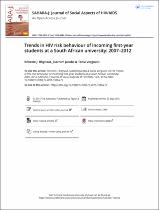Trends in HIV risk behaviour of incoming first-year students at a South African university: 2007–2012
Abstract
The aim of the research on which this article is based was to understand the behavioural changes of the target student populationover time to ensure that future prevention programmes are more effective in changing behaviour. This study reports on quantitativedata collected at the University of the Western Cape over a six-year period between 2007 and 2012. All the students attending theorientation sessions and who were willing to complete the anonymous questionnaire during each of the six years were included inthe study. Data were collected on the following aspects and subjects: sexual activity, age at first sexual encounter, number of sexualpartners, condom usage, knowledge of how to use a condom, perceived ability to discuss condoms usage with a sexual partner,perception of HIV risk and HIV testing as well as the intention to be tested. Reported alcohol and drug usage, as well asdepressive symptoms, was also recorded. The percentage of students reporting having had vaginal sex prior to enteringuniversity increased from 44% in 2007 to 51% in 2012 but, alarmingly, the consistent use of condoms decreased from 60% in2007 to 51% in 2012. The average onset age of about 15.6 years for males and 16.7 years for females for vaginal sex did notchange over the six-year period. No difference in smoking patterns or drug use was seen over the period of the study, but thenumber of entering students who indicated that they consumed alcohol increased significantly from 48% in 2007 to 58% in2012.

